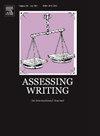考察任务准备条件下二语写作焦虑对二语简单和复杂任务写作表现的预测能力
IF 5.5
1区 文学
Q1 EDUCATION & EDUCATIONAL RESEARCH
引用次数: 0
摘要
基于任务的研究在开发教学材料和课程时往往忽视了个体差异和任务准备因素。本研究通过考察二语写作焦虑如何在任务准备条件下(任务重复和任务预演)影响具有不同认知需求的任务中写作表现的复杂性、准确性、词汇量和流畅性(CALF)来解决这些差距。90名本科ESL学生在执行两项不同认知复杂性的辩论任务之前完成了一份关于第二语言写作焦虑的问卷,两项任务在平衡设计中间隔一周进行。在完成第一组任务后,参与者填写了一份感知问卷来验证任务复杂性的操纵。然后他们在同样的时间框架内重复同样的任务。研究结果显示,虽然焦虑对句法复杂性有积极影响,但总体上对准确性有负面影响。在任务重复(内隐准备)条件下,焦虑降低了句法复杂性和准确性。相反,在任务排练(有意识准备)下,焦虑对词汇复杂性有积极影响。具体而言,在第二次表演中,焦虑提高了任务排练下的准确性和词汇复杂性,提高了任务重复下的流利性和词汇复杂性。然而,在任务预演下,焦虑降低了简单和复杂任务的句法复杂性。在任务重复的情况下,焦虑会恶化词汇复杂性,但仅在执行复杂任务时如此。此外,任务重复在MLTU、DC/T、cn / t、EFC/C、Vocd和WRDFRQmc这8个测量指标中的6个优于任务排练。在这六项测量中,认知复杂的任务也比简单的任务产生了更好的结果,以及WMP。在第二次尝试中,所有测量和WMP的性能都有所提高。本文章由计算机程序翻译,如有差异,请以英文原文为准。
Examining the predictive power of L2 writing anxiety on L2 writing performance in simple and complex tasks under task-readiness conditions
Task-based research has often overlooked individual differences (IDs) and task-readiness factors in developing instructional materials and curricula. This study addresses these gaps by examining how L2 writing anxiety influences the Complexity, Accuracy, Lexis, and Fluency (CALF) of writing performance across tasks with varying cognitive demands under two task-readiness conditions: task repetition and task rehearsal. Ninety undergraduate ESL students completed a questionnaire on L2 writing anxiety before performing two argumentative tasks of differing cognitive complexity, administered one week apart in a counterbalanced design. After completing the first set of tasks, participants filled out a perception questionnaire to validate the task complexity manipulation. They then repeated the same tasks within the same timeframe. The findings revealed that while anxiety positively affected syntactic complexity, it negatively impacted accuracy overall. Under task repetition (implicit preparation), anxiety reduced both syntactic complexity and accuracy. In contrast, under task rehearsal (conscious preparation), anxiety had a positive effect on lexical complexity. Specifically, in the second performance, anxiety improved both accuracy and lexical complexity under task rehearsal and enhanced fluency and lexical complexity under task repetition. However, under task rehearsal, anxiety reduced syntactic complexity for both simple and complex tasks. Under task repetition, anxiety deteriorated lexical complexity, but only when the complex task was performed. Furthermore, task repetition outperformed task rehearsal in six out of eight measures: MLTU, DC/T, CN/T, EFC/C, Vocd, and WRDFRQmc. The cognitively complex task also produced better outcomes than the simple task across these six measures, as well as WMP. Performance improved on the second attempt across all measures and WMP.
求助全文
通过发布文献求助,成功后即可免费获取论文全文。
去求助
来源期刊

Assessing Writing
Multiple-
CiteScore
6.00
自引率
17.90%
发文量
67
期刊介绍:
Assessing Writing is a refereed international journal providing a forum for ideas, research and practice on the assessment of written language. Assessing Writing publishes articles, book reviews, conference reports, and academic exchanges concerning writing assessments of all kinds, including traditional (direct and standardised forms of) testing of writing, alternative performance assessments (such as portfolios), workplace sampling and classroom assessment. The journal focuses on all stages of the writing assessment process, including needs evaluation, assessment creation, implementation, and validation, and test development.
 求助内容:
求助内容: 应助结果提醒方式:
应助结果提醒方式:


